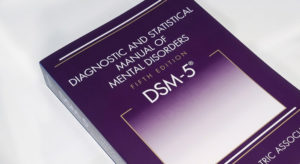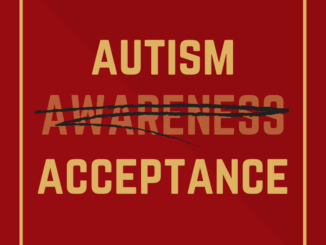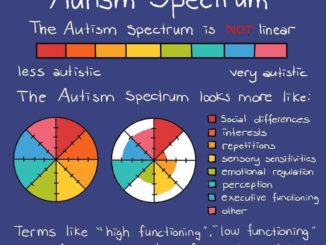
“What about the DSM definition of autism?”
This is the kind of question that I’m more likely to get from experts who are maybe trying to wrap their head around a neurodiversity paradigm but having trouble letting go of what they’ve been taught in schools or other institutions.
The DSM is the Diagnostic and Statistic Manual of Mental Disorders, aka the book used by clinical psychologists to diagnose mental disorders. And autism, in the form of “ASD” or Autism spectrum disorder, is currently classified as one of those mental disorders. Remember when I was arguing that autism is a disability, but isn’t a disorder? Yeah, you’ll see why this prickles at some people.
I understand that there is a lot of complication and nuance here. As a healthcare professional who works within the American healthcare system, I understand that there are times when I “play the game” within the system — talk about deficits instead of strengths, report on percentages that I think may not best represent a kid, etc — in order to get access to help that I do think is what’s best for the kid. Because the system is screwed up a hundred different ways, and while I do work in this sphere and in other spheres to try to change that, I also still have to account for the children who are within it right this very second.
(To be very clear — I am not a diagnosing professional and I don’t diagnose autism — I’m drawing an analogy between myself working in OT, and the way I can empathize with psychologists and other professionals who may also be neurodiversity-affirming but feel “stuck” using terminology like ASD because it’s what is required for a diagnosis at this point.)
Anyway, the DSM definition is, obviously, written from an extremely negative and deficits-based standpoint. It’s also written as a list of traits that many Autistic people would argue are actually better described as representing Autistic trauma, not just an Autistic way of being.
(If you’re having trouble picturing the difference, imagine a non-healthcare professional telling you, “I suspect my child is Autistic because he self-harms by hitting himself in the head” versus “I suspect my child is Autistic because he loves to watch the way shadows play on the wall when he lays in a sunbeam and moves his fingers in front of his eyes”. Both of those children might be Autistic, both of those are worth investigating further into, but one of those children is clearly experiencing distress as well, not just an Autistic way of being.)
So what would a definition sound like that’s not rooted in deficits and isn’t rooted in trauma? I love this person’s effort to “translate” the DSM language into a more understandable and more human-sounding version.


